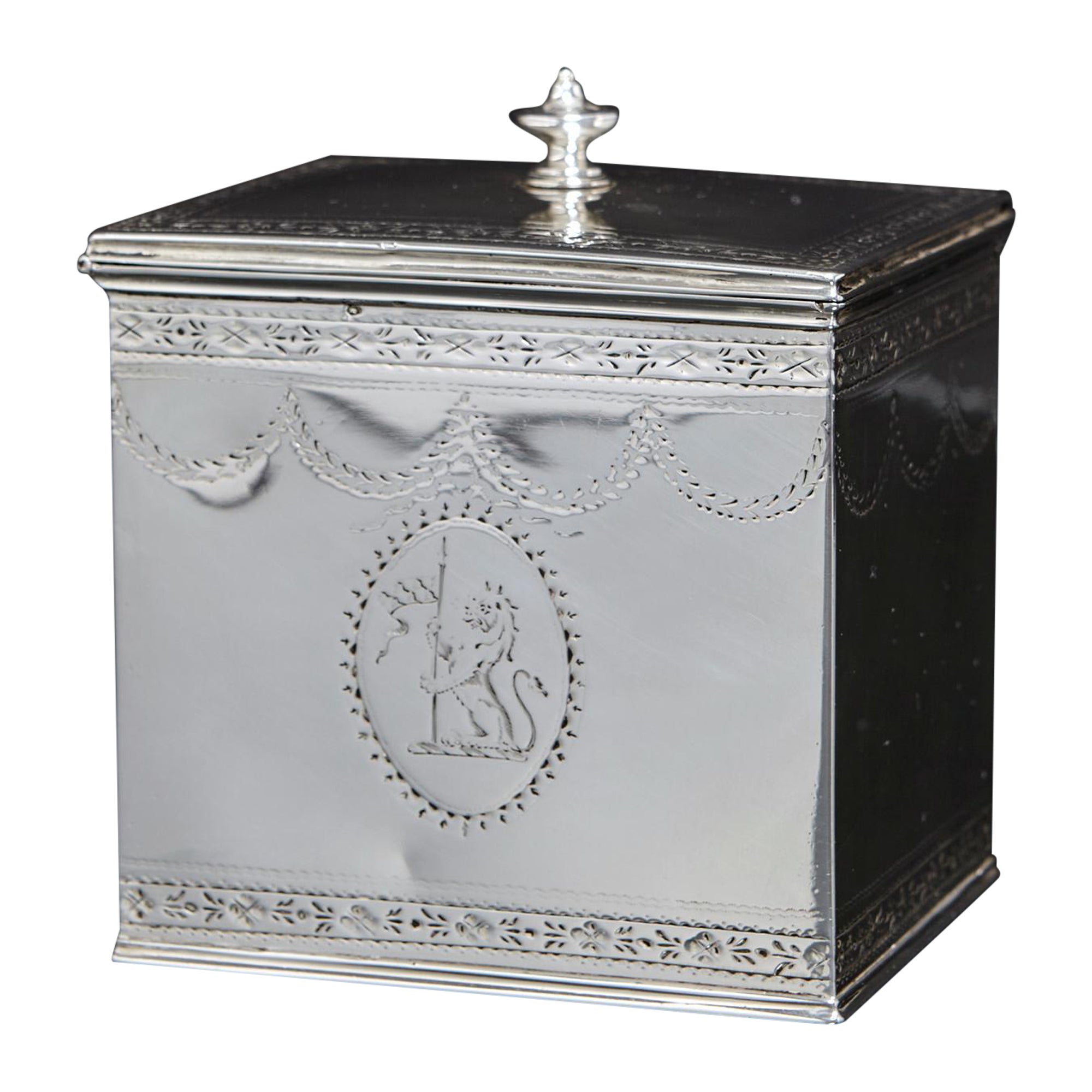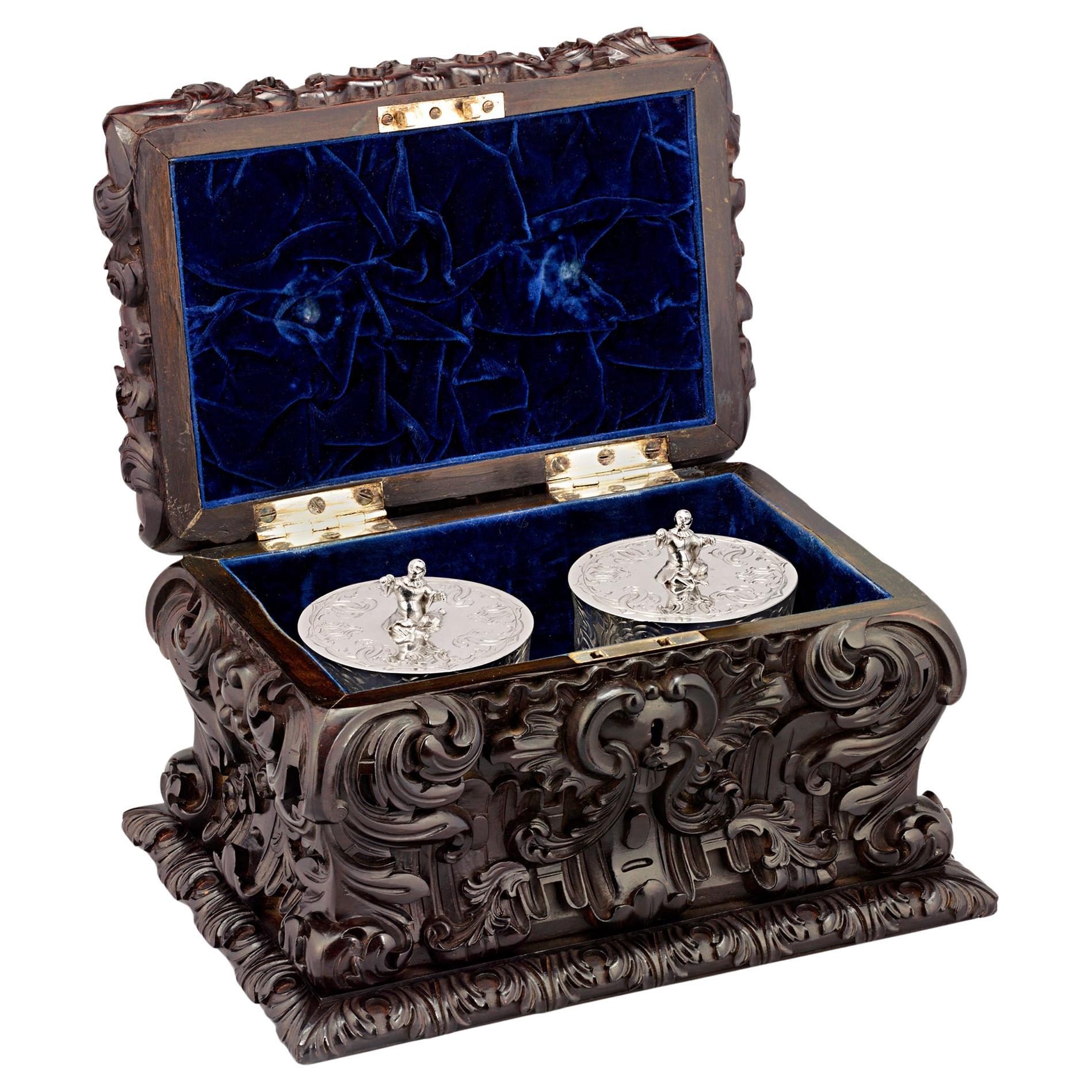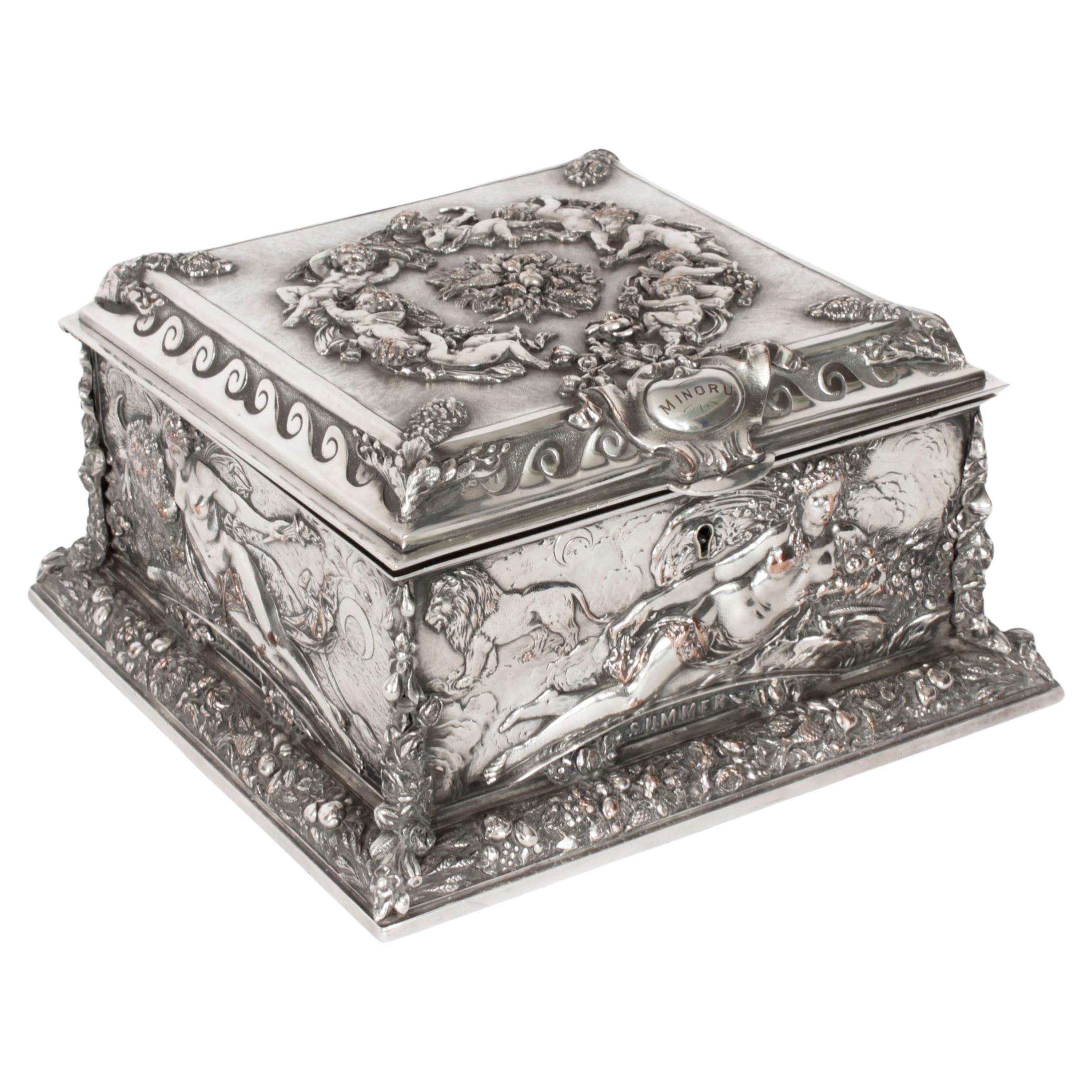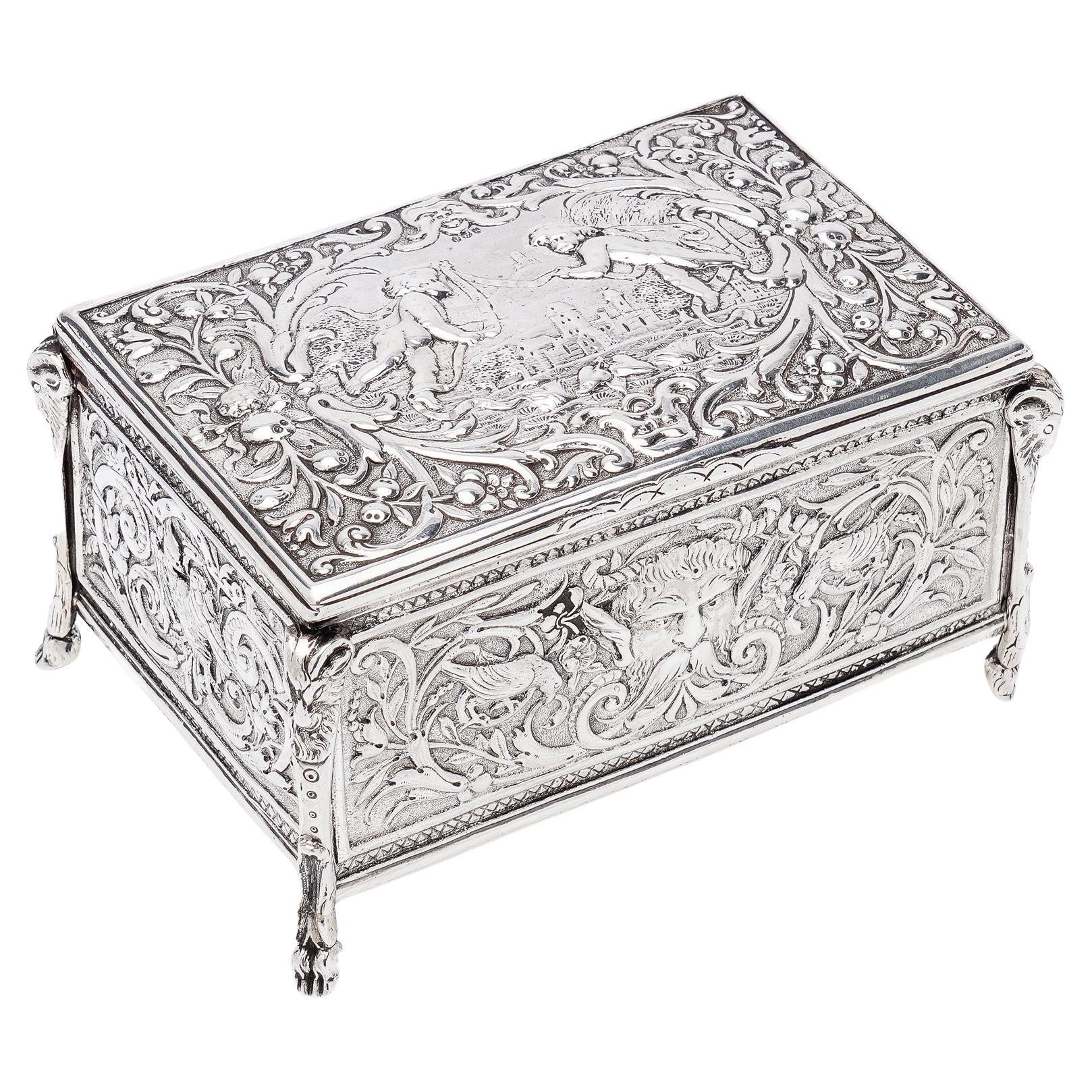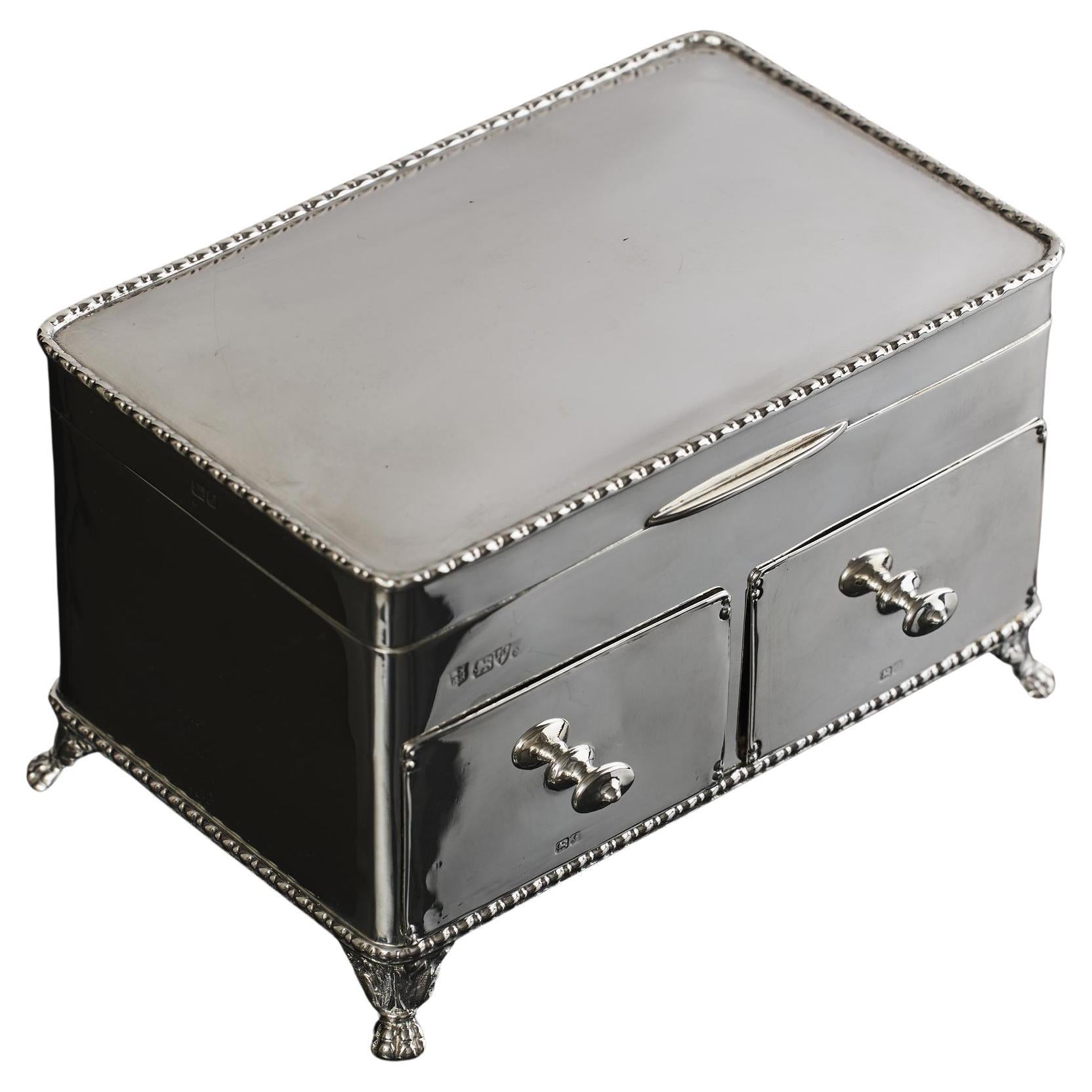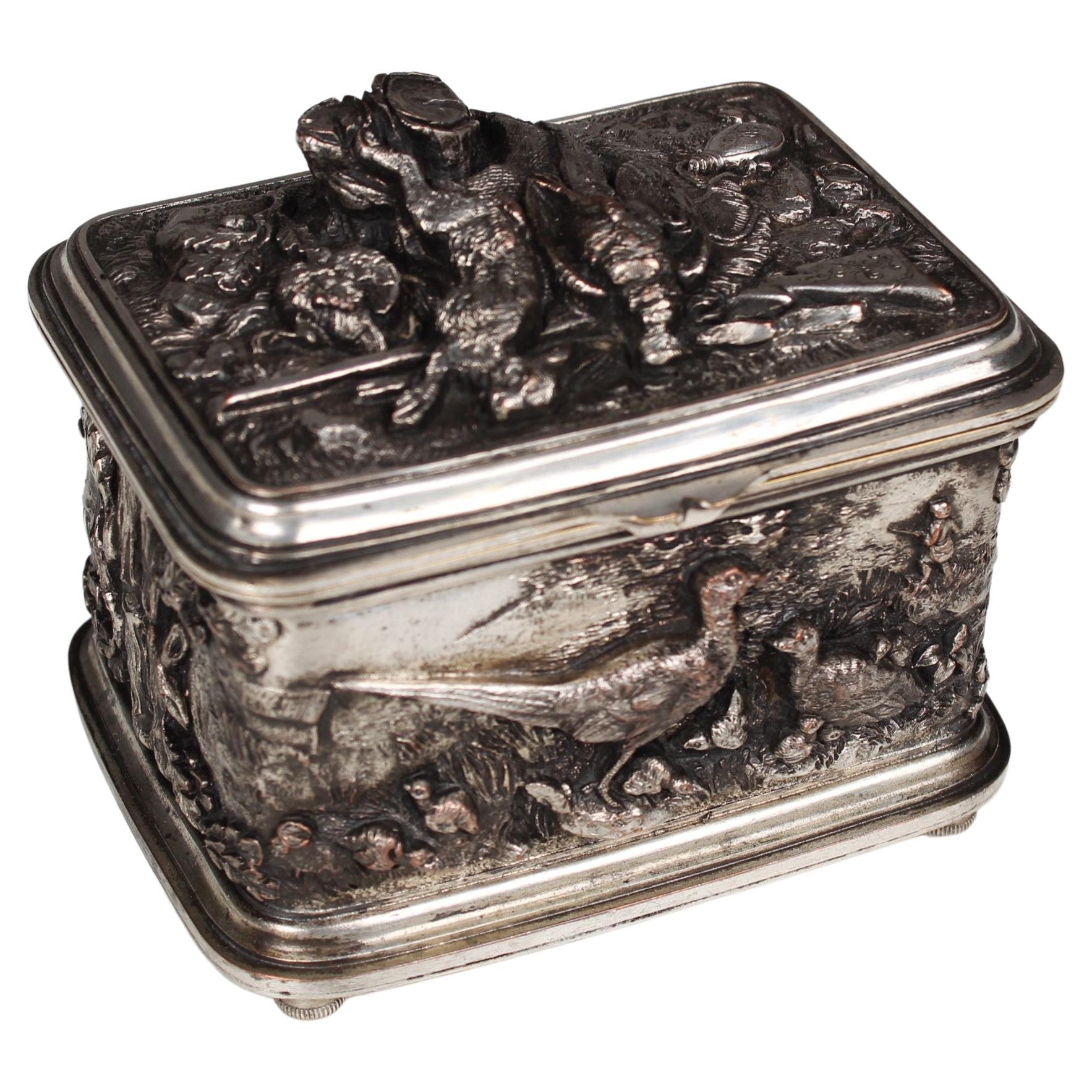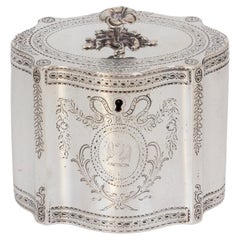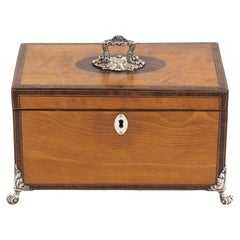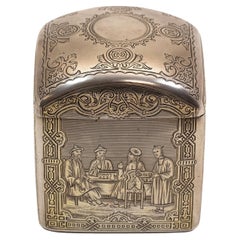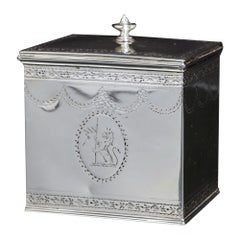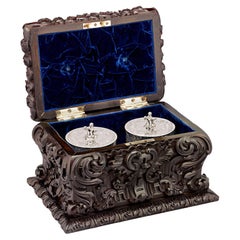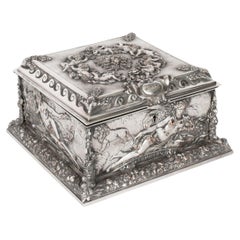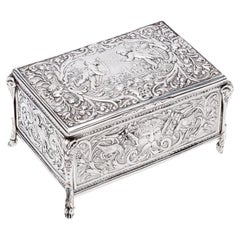Items Similar to Antique Victorian Royal Horse Racing Prize Tea Chest with Silver Tea Caddies
Want more images or videos?
Request additional images or videos from the seller
1 of 21
Antique Victorian Royal Horse Racing Prize Tea Chest with Silver Tea Caddies
$19,358.67
£14,000
€16,497.92
CA$26,822.40
A$29,123.92
CHF 15,423.25
MX$356,975.80
NOK 190,868.74
SEK 180,360.85
DKK 123,133.72
About the Item
Awarded at Fernhill 18th August 1843
From our Tea Caddy collection, we are thrilled to offer this Ebonised Tea Chest given as a Royal Prize is 1843. The Tea Chest of rectangular form with an Ebonised body and a Sterling Silver handle, escutcheon and fittings. To the top a plaque reads ‘Royal Prize 1843’ with each piece hallmarked Sterling, London, Sebastian Crespel II and dated 1842. When opened the Tea Chest reveals a dark blue ruched velvet inner lid, Silver hinges hallmarked Sterling, London by George Reid and two fitted partitions housing two extensively decorated Tea Caddies. Each tea caddy decorated in the Rococo Chinoiserie style shaped in square form and raised upon scrolling feet with repousse decoration throughout displaying traditional Chinese pagoda buildings and a figure picking fruit from a tree below high quality overlooking lion masks. The Tea Caddies decorated in the manner of renowned 18th century silversmith Paul de Lamerie. The Tea Caddies are hallmarked to the base Sterling, London, Joseph Angell I & Joseph Angell II and dated 1840. The base is also engraved ‘Royal Prize Won at Fernhill 18 August 1843’ below a family crest and two inital monograms. An exceptional Tea Caddy for any collection with great horse racing provenance and history.
Joseph Angell I & Joseph Angell II was founded by Joseph Angell I who was apprenticed to Henry Nutting in 1796, obtaining his freedom in 1804. Joseph Angell I entered his first mark in 1811 active as plate worker at 55 Compton Street, Clerkenwell. In 1831 he entered a joint mark with his brother John Angell (mark JA over IA, on 31 January 1831). Around 1837 Joseph Angell II (son of Joseph Angell I) joined to the partnership and the business was continued under the style Angell, Son & Angell. In 1840 Josephs brother departed the business and it continued as Joseph Angell & Son operating with the new mark JA over JA which was entered on the 6th of July 1840 and soon after in 1842 the business moved to 25 Panton Street, Haymarket. Joseph Angell I retired in 1848 and the business continued to be run by his son Joseph Angell II under his own name opening new retail premises at 10 Strand, Charing Cross (1849). Joseph Angell II exhibited in the 1851 Great Exhibition and was awarded a Prize Medal for his enamelled articles, he also attended the 1853 New York Exhibition winning the bronze medal and to the 1862 International Exhibition winning a further medal. The Angell family business became one of the largest and most important silver and jewellery manufacturers and retailers in London in the mid 19th century.
Sebastian Crespel II Sebastian & James Crespel were London silversmiths with little known documentation about their lives and careers. Their mark is assumed to have been entered in the famous missing largeworkers’ register around 1760. The Crespels are noted in Edward Wakelin’s workmen registers and deemed most likely that they learnt their trade in Wakelin’s workshop. The 1769 record entry displays them as supplying plates and dishes which coincides with the majority of their works. Their careers certainly seem to have been tied to Wakelin and from 1782 it’s likely that all pieces bearing their mark went through the latters’ hands. From 1788 Wakelin’s ledger account is headed ‘James Crespel’, indicating Sebastian’s probable death or retirement. The ledgers finish in October 1806 without any apparent successor to the business even though it was known that James Crespel had at least four sons apprenticed in the trade.
George Reid was a Silversmith based in London specialising in Boxes, decanter labels, lids and accessories. His works were often supplied to high end retailers such as Lund entering his first mark around 1823 and working until circa 1839. Further marks were registered in Mar 1811, 1817, 1824, 1828, 1829. It is believed that the business was Succeeded by Ann Reid possibly his widow AR mark within a matching oval punch.
Chinoiserie is a decorative style in Western art, furniture, and architecture that was undertaken particularly in the 18th century. It is characterized by the use of Chinese motifs and techniques hence the name Chinoiserie.
Paul Jacques de Lamerie (1688-1751) was a renowned London-based silversmith. The Victoria and Albert Museum describes him as the “greatest silversmith working in England in the 18th century”. He was being referred to as the “King’s silversmith” in 1717. Though his mark raises the market value of silver, his output was large and not all his pieces are outstanding. The volume of work bearing de Lamerie’s mark makes it almost certain that he subcontracted orders to other London silversmiths before applying his own mark.
Fernhill was the original name given to one of the handicap racers at Royal Ascot beginning in 1834 and later named ‘The Sandringham Stakes (Listed Handicap)’. The Fern Hill Stakes race was part of the traditional Heath Day card on the Saturday after Royal Ascot. It was renamed the Sandringham Stakes after the royal residence and as part of the Golden Jubilee celebrations in 2002. This is a competitive Listed handicap over a mile, limited to three-year-old fillies only.
Sterling Silver is an alloy composed by weight of 92.5% silver and 7.5% other metals, usually copper. The sterling silver standard has a minimum millesimal fineness (parts per thousand) of 925.
- Creator:Sebastian Crespel II (Metalworker)
- Dimensions:Height: 14.5 in (36.83 cm)Width: 22 in (55.88 cm)Depth: 14 in (35.56 cm)
- Style:Early Victorian (Of the Period)
- Materials and Techniques:
- Place of Origin:
- Period:
- Date of Manufacture:1843
- Condition:
- Seller Location:Northampton, GB
- Reference Number:Seller: 501337IAXE1stDibs: LU8027241802242
About the Seller
No Reviews Yet
Vetted Professional Seller
Every seller passes strict standards for authenticity and reliability
Established in 1998
1stDibs seller since 2023
32 sales on 1stDibs
- ShippingRetrieving quote...Shipping from: Northampton, United Kingdom
- Return Policy
Authenticity Guarantee
In the unlikely event there’s an issue with an item’s authenticity, contact us within 1 year for a full refund. DetailsMoney-Back Guarantee
If your item is not as described, is damaged in transit, or does not arrive, contact us within 7 days for a full refund. Details24-Hour Cancellation
You have a 24-hour grace period in which to reconsider your purchase, with no questions asked.Vetted Professional Sellers
Our world-class sellers must adhere to strict standards for service and quality, maintaining the integrity of our listings.Price-Match Guarantee
If you find that a seller listed the same item for a lower price elsewhere, we’ll match it.Trusted Global Delivery
Our best-in-class carrier network provides specialized shipping options worldwide, including custom delivery.More From This Seller
View AllAntique English Georgian Silver Tea Caddy by William Vincent
By William Vincent
Located in Northampton, GB
Hallmarked Sterling by William Vincent of London Dated 1779
From our Tea Caddy collection, we are delighted to offer this Georgian Sterling Silver Tea Caddy. The Tea Caddy of slight...
Category
Antique Late 18th Century English George III Tea Caddies
Materials
Sterling Silver
Antique English Coromandel & Silver Vanity Box by Hunt and Roskell
Located in Northampton, GB
By Hunt and Roskell
From our Vanity Box collection, we are delighted to offer this Coromandel Silver Gilt Vanity Box by Hunt and Roskell. The Vanity Box of rectangular shape with b...
Category
Antique Late 19th Century English Early Victorian Jewelry Boxes
Materials
Gold Plate, Silver, Sterling Silver, Brass
Georgian Silver Mounted Satinwood Tea Chest
Located in Northampton, GB
Georgian Tea Chest with Rosewood Cross Banding
From our Tea Caddy collection, we are delighted to offer this Georgian Satinwood Tea Chest. The Tea Chest of rectangular form veneered...
Category
Antique Late 18th Century English George III Tea Caddies
Materials
Silver
Antique Russian Solid Silver Chinoiserie Tea Caddy
By Victor Savinsky
Located in Northampton, GB
Rare Form with Chinoiserie Figures
From our Tea Caddy collection, we are delighted to introduce to the market this rare example Russian Silver Chinoiserie Tea Caddy. The Tea Caddy ...
Category
Antique Late 18th Century Russian Tea Caddies
Materials
Silver
Antique English Coromandel Sterling Silver Mounted Cigar Box
By Jane Brownett 1
Located in Northampton, GB
Hallmarked Silver 1886
From our Boxes collection, we are pleased to offer this Coromandel Silver Mounted Cigar Box. The Cigar Box of rectangular shape beautifully veneered in exotic...
Category
Antique Late 19th Century English High Victorian Tobacco Accessories
Materials
Sterling Silver
Triple Tiered Silver Smokers Compendium by Goldsmiths and Silversmiths Company
By Goldsmiths & Silversmiths Co. Ltd.
Located in Northampton, GB
Goldsmiths and Silversmiths Company
From our Silver collection, we are delighted to introduce to the market this Solid Silver Triple Tiered Smokers Compendium. The Silver Smokers Co...
Category
Antique Early 1900s English Art Nouveau Tobacco Accessories
Materials
Silver, Sterling Silver
You May Also Like
Antique George III sterling silver tea caddy
By Charles Aldridge & Henry Green
Located in London, GB
Classic late 18th century silver tea caddy of oblong form, and featuring delicately hand engraved bands and swags around the sides, and ...
Category
Antique 18th Century British George III Tea Caddies
Materials
Sterling Silver
Victorian Silver Tea Caddies by Charles Thomas Fox & George Fox
By Charles Thomas Fox & George Fox
Located in New Orleans, LA
Pair of Victorian Silver Tea Caddies in a Carved Ebony Case
Charles Thomas Fox & George Fox
Hallmarked London, 1845
Reflecting the 19th century’s deep reverence for tea, this except...
Category
Antique 19th Century English Victorian Tea Sets
Materials
Silver
Antique Victorian Silver Plated Jewellery Casket Walker and Hall 19thC
Located in London, GB
This is a lovely antique Victorian silver plated casket bearing the makers mark of the renowned silversmiths, Walker and Hall, Circa 1840 in date.
The square casket freatures an epic mythological scene of the four seasons with eight winged cherubs on the lid.
Each side features the four seasons: spring features a bull and a goddess, summer has a lion and a goddess, autumn has a scorpion and a goddess and winter has a cherub and goddess.
The interior of the box features its original quilted buttoned silk upholstery.
Add some elegance to your home with this lovely casket.
Condition:
In excellent condition with no dings, dents or signs of repair. Please see photos for confirmation.
Dimensions in cm:
Height 15 cm x Width 24 cm x Depth 24 cm
Dimensions in inches:
Height 6 inches x Width 9 inches x Depth 9 inches
Walker & Hall
the business was established in Sheffield in 1845 by George Walker who become an assistant of Dr John Wright. Dr John Wright had conducted important experiments on electroplating, Walker secured the royalty of electroplating for Sheffield.
The business was joined by Henry Hall and became in 1853 Walker & Hall. The factory was at Howard Street, Sheffield, while showrooms were opened in 45 Holborn Viaduct, London. Branches were opened in Liverpool, Manchester, Leeds, Glasgow, Edinburgh, Newcastle, Cardiff, Belfast, Hull, Bristol, Melbourne and Adelaide (Australia), Cape Town (South Africa).
Walker & Hall was converted into a limited liability company in 1920 under the style Walker & Hall Ltd and combined in 1963 under the British Silverware...
Category
Antique 1840s Decorative Boxes
Materials
Silver Plate
Antique Late 19th Century Silver Repoussé Decorated Jewellery Box with Cherubs
Located in Braintree, GB
Antique Late 19th century silver repoussé decorated jewellery box with Cherubs, Forest God in the centre surrounded by the birds and floral motifs .
Interior is decorated with gre...
Category
Antique 1890s Jewelry Boxes
Materials
Silver
Antique Edwardian sterling silver jewellery box with drawers
By Nathan & Hayes
Located in London, GB
Handmade, late-Edwardian-era antique silver jewel box mounted on four leaf-and-claw supports and featuring two silver-fronted, pull-out wooden drawers and a gilt-lined hinged cover.
...
Category
Early 20th Century British Edwardian Jewelry Boxes
Materials
Sterling Silver
Antique Jewelry Box "The Hunt", 1910s, Silvered, Art Nouveau, Iron Craftmanship
Located in Greven, DE
Exceptional antique jewelry box with fine depictions of hunting themes and forest animals.
Heavy iron work, silvered in a very good condition.
Lined with turquoise fabric in a good c...
Category
Early 20th Century French Art Nouveau Jewelry Boxes
Materials
Iron
More Ways To Browse
1851 Great Exhibition
Antique Horse Racing
Horse Racing Antique
Antique Fruit Trees
Antique Silver Horse
Hand Carved Wood Horse Head
Silver Plate With Lion Handles
Decanter Box
Antique Decanter Box
Black Ebonized Chest
Antique Decanter Labels
Pagoda Display
John Angell
Silver Horse Racing Box
Tortoiseshell Tea Caddies
Black Lacquer Tea Caddy
Georgian Mahogany Tea Caddy
Antique Chinese Lacquer Tea Caddy Tea Caddies
